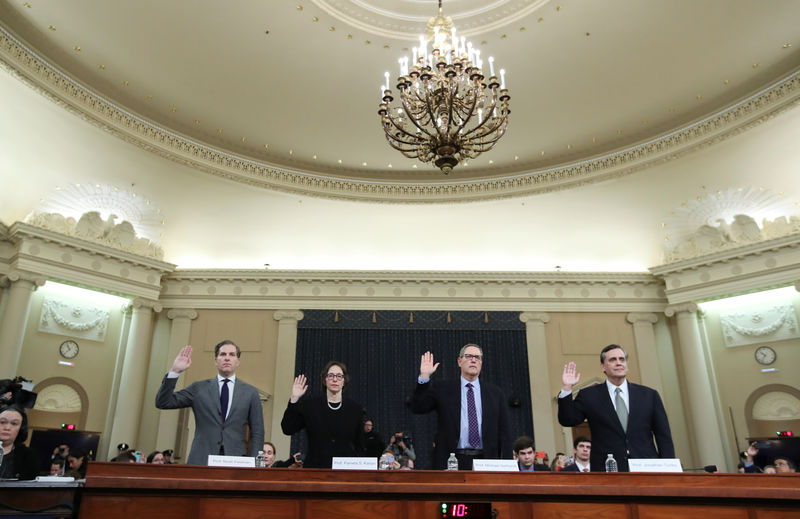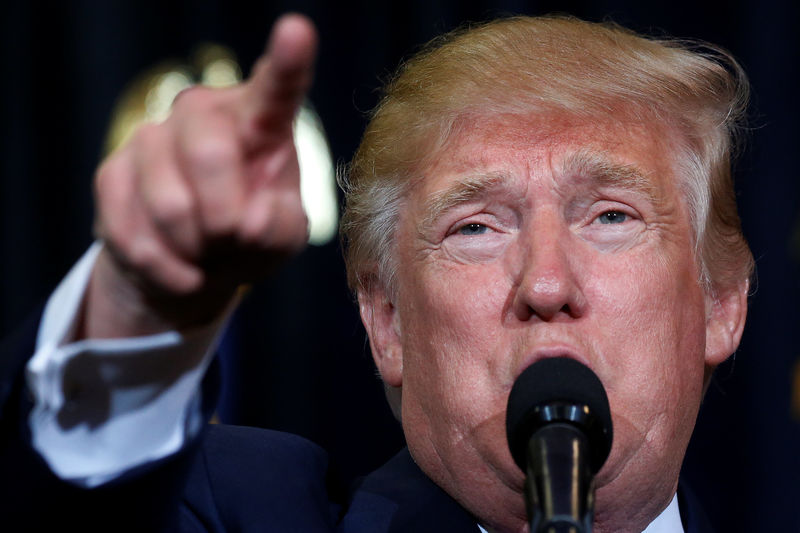(Reuters) - The U.S. House of Representatives Judiciary committee called four witnesses in its first hearing on the impeachment of President Donald Trump that started Wednesday morning.
They were planning to speak on what the U.S. Constitution says about removing a president from office, and whether Trump abused the power he has, based on their written testimony submitted earlier.
Here are the highlights:
Harvard Law School Professor Noah Feldman wrote Trump had abused http://docs.house.gov/meetings/JU/JU00/20191204/110281/HHRG-116-JU00-Wstate-FeldmanP-20191204.pdf his office by asking Ukrainian President Volodymyr Zelenskiy to announce investigations of his political rivals to gain personal advantage, including in the 2020 election.
Detailing the writing of the Constitution and the founders' thoughts on the impeachment process, Feldman wrote that American impeachment was based on the English tradition, but with one key exception: in England, the king was above the law. "In stark contrast, the president of the United States would be subject to the law like any other citizen," he wrote.
"The idea of impeachment was therefore absolutely central to the republican form of government ordained by the Constitution," Feldman wrote, explaining that the authors of the Constitution did not believe that re-election was a sufficient check on presidential power.
Michael Gerhardt of the University of North Carolina law school wrote that evidence so far http://docs.house.gov/meetings/JU/JU00/20191204/110281/HHRG-116-JU00-Wstate-GerhardtP-20191204.pdf shows Trump has committed impeachable offenses, including bribery, abuse of power in soliciting a personal favor from a foreign leader to benefit his political campaign, obstructing Congress and obstructing justice.
Trump's actions are worse than President Richard Nixon's, he wrote.
"When we apply our constitutional law to the facts found in the Mueller Report and other public sources, I cannot help but conclude that this president has attacked each of the Constitution's safeguards against establishing a monarchy in this country," he wrote. "If left unchecked, the president will likely continue his pattern of soliciting foreign interference on his behalf in the next election."
He admonished Republicans, writing, "If Congress fails to impeach here, then the impeachment process has lost all meaning, and, along with that, our Constitution’s carefully crafted safeguards against the establishment of a king on American soil."
Pamela S. Karlan of Stanford University law school also wrote she believed https://docs.house.gov/meetings/JU/JU00/20191204/110281/HHRG-116-JU00-Wstate-KarlanP-20191204.pdf Trump had abused his power by demanding foreign involvement in the upcoming U.S. election. Trump's actions "struck at the very heart of what makes this country the 'republic' to which we pledge allegiance."
She wrote the evidence shows Trump sought to "strong-arm" Zelenskiy into smearing one of his opponents. "This is not politics as usual - at least not in the United States or any other mature democracy. It is, instead, a cardinal reason why the Constitution contains an impeachment power."
An expert on voting rights, Karlan wrote that Trump's actions threatened democracy. "But our elections become less free when they are distorted by foreign interference. What happened in 2016 was bad enough: there is widespread agreement that Russian operatives intervened to manipulate our political process. But that distortion is magnified if a sitting President abuses the powers of his office actually to invite foreign intervention," she wrote.
Jonathan Turley, a law professor at Georgetown University, and the only Republican witness, criticized Trump's conduct https://docs.house.gov/meetings/JU/JU00/20191204/110281/HHRG-116-JU00-Wstate-TurleyP-20191204.pdf, but said that the House has not made the case for impeachment.
“One can oppose President Trump’s policies or actions but still conclude that the current legal case for impeachment is not just woefully inadequate, but in some respects, dangerous, as the basis for the impeachment of an American president," he wrote.
“If the House proceeds solely on the Ukrainian allegations, this impeachment would stand out among modern impeachments as the shortest proceeding, with the thinnest evidentiary record, and the narrowest grounds ever used to impeach a president. That does not bode well for future presidents who are working in a country often sharply and, at times, bitterly divided.”

Turley added "I get it. You are mad. The President is mad. My Democratic friends are mad. My Republican friends are mad. My wife is mad. My kids are mad. Even my dog is mad - and Luna is a golden doodle and they are never mad.”
